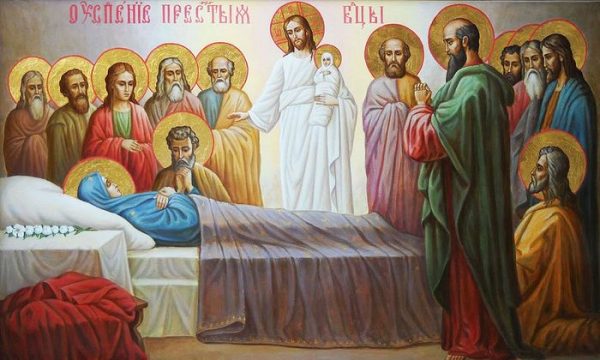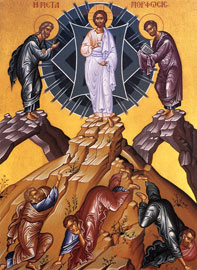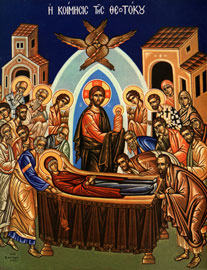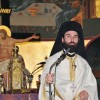In the Divine Liturgy of Saint John Chrysostom celebrated in the Orthodox Church, the priest repeats the following prayer a number of times: Let us commit ourselves and one another, and our whole life to Christ our God.
The ecclesiastical year, which begins on September 1st (14th), has been divinely developed by the Church Fathers with feasts and fasts to aid our life in the God-Man Christ.
The longest and strictest fast, Great Lent, paves the way for Pascha (Easter), the Feast of Feasts. In addition to Lent, there are three other periods of prescribed fasting: that of the Apostles in June; the Dormition; and, that of Christmas in November-December.
The One, Holy, Catholic and Apostolic Church observes the Holy Dormition Fast; this period, which lasts two weeks from the 1st/14th to the 14th/27th of August, culminates on the 15th/28th with the celebration of the Falling Asleep (Dormition) of the Mother of God (Gr. Theotokos).
Before this, though, on August 6th/19th, Orthodoxy celebrates another one of the Twelve Great Feasts, that is, the Transfiguration (Metamorphosis) of Our Lord, God and Savior Jesus Christ, and allows for a break in the fast through the consumption of fish.
The holiness of these two weeks gives fuel for the faithful to energize their spiritual struggle; this is one reason why the Dormition period is affectionately known as the Summer Pascha (το Πασχα του Καλοκαιριου, in Greek).
Let us then briefly examine the theological and spiritual significance of these two feasts through the homilies of Saint Gregory Palamas (1296-1359), who represents Christian theology at its most sublime.
Unlike some who deny the truth, St. Gregory demonstrates clearly that the Light of the Transfiguration is uncreated. “While pretending to concern themselves with the literal sense of the passage, they reject its godly meaning,” Palamas writes.
In Matthew’s Gospel (see 17:1-9; see also Luke 9:28-36), the Evangelist recounts the manifestation of Christ’s divinity through a display of His divine energy on Mount Tabor: “And He was transfigured before them. His face shone like the sun, and His clothes became as white as the light” (Mt 17:2).
This theophany was beheld by three of His disciples – Peter, James and John – as well as by Moses and Elijah. God the Father also spoke, “This is My beloved Son, in whom I am well pleased. Hear Him!” (Mt 17:5), confirming Jesus’ divine sonship.
The attainment of this light is the ultimate goal of Orthodox Christians and can be achieved by dedicating “our whole life to Christ our God” as the Holy Chrysostom says.
“The divine light is given by measure and is received to a greater or lesser extent, being distributed, undividedly divided, according to the worthiness of the recipients,” declares St. Gregory, although this in no way should be confused with God’s essence, which is “absolutely indivisible and incomprehensible, and no other being can receive it, either to a greater or lesser extent.”
We have no better example, no better prototype, to lead us to Christ’s ineffable glory than His Mother, the Most Holy Lady and Ever-Virgin Mary, the Holy of Holies, whose Dormition we celebrate today.
St. Gregory writes:
She showed that her whole life, her behaviour, her mind and her words, were utterly devoted to godly striving. As a result of this, her death, too, was life-giving and led to heavenly, immortal life, and its day of remembrance is a joyful holiday and worldwide festival… For at present she is the only one who has a place in heaven with her divinely glorified body in the company of her Son.
Orthodoxy venerates the Theotokos through its icons, hymns and feasts and prays for her intercessions to her Son and our God. A special honour in the liturgical life of the Church is given to the Axion Estin hymn:
It is truly right to bless you, Theotokos, ever blessed, most pure, and Mother of our God. Higher in honor than the Cherubim, and beyond compare more glorious than the Seraphim, who without corruption gave birth to God the Logos. Most truly Theotokos, you do we magnify.
Like Pascha, the Great Feasts of the Dormition Fast call us to “Love the Lord your God with all your heart, with all your soul, with all your mind, and with all your strength” (Mk 12:30). The Transfiguration shows us that we can experience the Kingdom of God here on earth, while the Dormition shows us that through our faith and good works and Christ’s love and mercy, we can attain immortal life; since, as St. Gregory Palamas describes: “Christ as God is for those who live by the Spirit and see with spiritual eyes what the sun is for those who live by their senses and see with natural vision.”

















